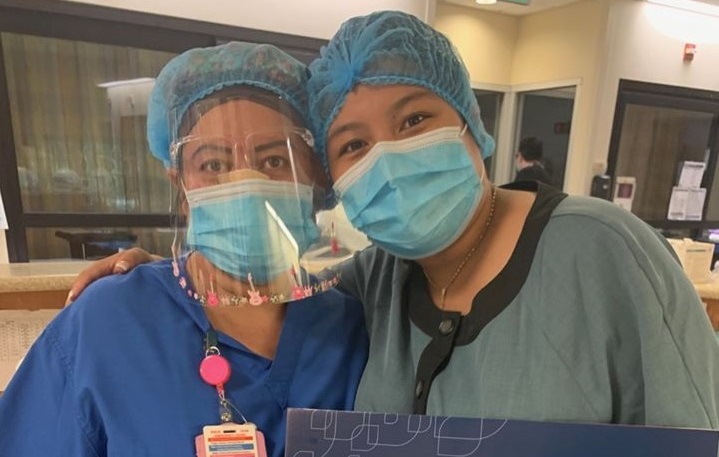'That could be one of my family members': Mother-daughter housekeeping team faces COVID realities daily
Jul 29, 2020

When Erika Hernandez leaves work each day at Adventist Health Simi Valley, she practices the same tedious routine.
She strips off soiled scrubs, showers before leaving the hospital, and then eases herself into her car. She’s careful to put her shoes into a plastic bag, driving home in sandals she keeps on the floorboard. After pulling into the garage, she changes again, washes her hands and takes another shower.
“And only after that do I pick up my baby,” said Erika, referring to her 17-month-old daughter.
It’s the lengths that Erika has been going to after each shift since the pandemic began to keep her and her family healthy, and something many of whom working in the COVID-19 unit consider essential. Erika has even taught that routine to her 20-year-old daughter, Yamilex, who works at the hospital beside her cleaning patient rooms in that same unit, and has toddler of her own.
“When we come to work, we just come to work,” Erika said. “We don’t go shop after or do anything else because we want to protect ourselves and our families, and most importantly our little ones.”
As environmental services associates who spend their days cleaning patient rooms, Erika and Yamilex don’t get the same attention or fanfare as nurses or doctors do on a national stage. But they are among the countless hospital workers who, despite fears for themselves and their families, quietly step onto the front lines of the pandemic each day to keep our communities safe.
“The nurses and staff are all happy because they have housekeepers who are strong and who are capable of cleaning the patient's room, and not being terrified, scared or panicked,” Yamilex said, gesturing toward her mother.
But she still knows that everyone should operate with a sense of caution. COVID-19 doesn’t discriminate. Day after day, she watches more critically ill patients arrive in the unit. In several instances, family members of those patients who have been exposed end up in beds beside their loved ones. Mother and daughter; sister and brother; husband and wife all sharing rooms in the COVID-19 unit.
“When you’re in the room with these patients, you see how delicate they are,” Yamilex said. “You tell yourself: ‘that could be one of my family members.’”
She wasn’t wrong.
Just weeks ago, an aunt from out-of-state decided to surprise visit Yamilex’s grandmother, who lives in Arvin, a small farmworker community south of Bakersfield. The result? Multiple members of Yamilex’s family got sick with COVID-19, and her grandmother, who is diabetic, was hospitalized and hooked up to a ventilator for more than a month.
Yamilex and Erika found themselves in the same position they find so many of their patients: struggling with the grief and anxiety that comes with not being able to visit a loved one in need.
“We would video call her, and it was painful because we never knew if we would see our grandma again,” Yamilex said. “When we saw her hospitalized and intubated, tears came out and we went to the Lord and were praying morning, noon and night for her to be safe. We were praying for a miracle.”
And a miracle came, and now Yamilex’s grandmother—Erika’s mother—is recovering well at home.
Meanwhile, Erika and Yamilex continue to go to work each day; continue to see more and more patients arrive in the COVID unit; continue to scrub themselves clean after their shifts, physically distance from others and wear their masks.
And they plead with their patients to do the same.

